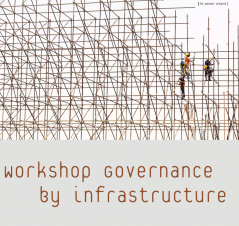Congrès
The governance of the large sociotechnical systems that invisibly power and support the social world has long been a focus of STS scholars. One may recall the work of Hughes (1983) on the electrification of America, Star and Bowker (1996) on classifications and standards, or Latour (1993) on the Berlin Key. When we speak of infrastructure, and as Bowker and colleagues (2010) note, we often think of large collections of materials necessary for human organization and activity, such as buildings, roads, bridges, and physical networks of communication. But beyond bricks, mortar, pipes, or wires, infrastructure also includes entities such as protocols, standards, or system architectures. These more abstract entities are part of infrastructure because they perform an infrastructural function. That is, they help to shape, enable or constrain our common life.
Starting from the classical studies of infrastructure, STS has developed a rich inquiry between computer and social scientists, charting the development of information infrastructures in various social contexts (Monteiro, Pollock and Williams, 2014). This research is complemented by at least two other research fields interested in infrastructure in its functional sense: platform studies and Internet studies. The first has been primarily concerned with large platforms such as Google, Facebook, Twitter, Uber, Airbnb or Wikipedia, sometimes with more localized cooperative platforms (Scholz, 2014; Plantin et al., 2018). The second has been mainly interested in the Internet itself of course, but also in Internet-based services, sometimes built in a technically distributed mode (Musiani and Dulong de Rosnay, 2016).
These different fields have opened question of governance and infrastructure. While some scholars explore the governance of platforms and infrastructures via institutions and regulation, others have engaged in a questioning of governance, where governance is understood as a set of dynamics of “social ordering” (Law, 1992) that does not take place exclusively, or even primarily, in politically designed institutions, but is also enacted through the ordinary practices of people engaged in maintaining or challenging the social order (Musiani, 2016). Branches of government, stakeholders and advocacy groups, policy makers, technology designers, platform companies or contractors, and users, all participate in governance. By focusing on governance by infrastructure, this workshop aims to interrogate how technologies, infrastructures, platforms, devices, algorithms, reflect and influence, meditate and translate ordering processes. The starting point is the technical object and the way in which it, in its design or in its uses, acts on the social order. We wish to understand how infrastructures lead to transformations of society, by bringing changes in governance, possibly embedded in their design.
Programme
March 17th
08:30 Welcome and introduction (Léa Stiefel and James Besse)
08:45 Opening Keynote
Prof. Robin Williams: Understanding Information Infrastructures II
Session 1: Studying Governance through an II lens: theoretical and methodological frameworks
Chair: Morgan Currie
09:45 Antti Silvast, Robin Williams and Sampsa Hyysalo: Energy Supply as an Information Infrastructure: A Reconceptualization of Governance by Infrastructure
10:15 Sarah Wolters: Smart Grids as Information Infrastructures
10:45 Coffee break
11:15 Ben Collier and James Stewart: Influence Government: Practices and power in the surveillance influence infrastructure
11:45 Basile Zimmermann: The Knife, the Starfish, and the Sandcastle: an inquiry into the ontology of governance by infrastructure
12:15 Lunch
13:45 Mylène Tanferri: Micro-infrastructures: when a team is devising its own ordering devices
14:15 Timo Walter: Rational Expectations and the social ordering of the future: a semiotic analysis of its infrastructure
14:45 Break
Session 2: Public-Private and Community-Based Infrastructures: opening up participation
Chair: Olivier Glassey
15:00 Jessica Pidoux: What is a sustainable model for data collectives?
15:30 Ari Stillman: The Labor Economy as Fractured Infrastructure
16:00 Lara Dal Molin: Large Language Models as Gender-Shaping Infrastructures
16:30 Coffee break
17:00 Alain Sandoz: The role of rules, requirements, and principles in the design of information infrastructures
17:30 Léa Stiefel: Architecting a distributed system for data sharing between untrusting actors
18:00 Andrey Elizondo: Orchestration Spaces in the long-term development of shared information infrastructures in inter-organizational ecosystems: Case on the early orchestration of a regional interoperability platform in NHS England
18:30 Aperitif & dinner
March 18th
Session 3: Public and Private Infrastructures: raising concerns
Chair: Antti Silvast
08:30 Morgan Currie: Automating Universal Credit
09:00 Shrikant Wad and Ankur Sarin: Can online portals get marginalised children into private schools? Lessons from India
09:30 Abby King: Telehealth and Orderings of (In)Equity in New Mexico’s Mental Healthcare System
10:00 Hadewych Honne: Interoperability at the cost of patient empowerment? The EU Rare Disease Common Data Elements for rare disease registry integration
10:30 Coffee break
11:00 Sophie Taylor: Assembling AI. Discursive infrastructures and the UK’s National AI Strategy
11:30 Olivier Glassey: Building large-scale infrastructure to harness imagination: how roblox’s platform design, shapes, enrols, captures and exploits teenagers’ creativity
12:00 Tatiana Smirnova: Governance by infrastructure of social media platforms and their affections-effects in the case of a specific event
12:30 Lunch
Session 4: Public and Research Infrastructures: challenging assumptions
Chair: Alain Sandoz
14:00 James Besse: Understanding the Preconditions of Information Infrastructure: A Study of the EU Settlement Scheme’s Contribution to the Digitalization of the British Immigration System
14:30 Varun Sai: Reviewing Aadhaar enabled governance in Inda
15:00 Isadora Dullaert: The Conflation of Legal and Digital Identity: How Digital ID is Shaping the Legal Identity Space
15:30 Break
15:45 Jongheon Kim: A research infrastructure almost no one wanted
16:15 Jarmo De Vries: NHS Genomic Medicine Service’s Test Directory: shaping a new knowledge control regime of genetic and genomic testing services
16:45 Coffee break
17:15 Florian Jaton: Ground that: Enforcing a benchmark for neoantigen prediction in personalized immuno-oncology
17:45 Mayline Strouk: Governing Svalbard through research infrastructures
18:15 Closing Keynote
Prof. Valérie Schafer: Networks, governance and design: a journey through some historical case studies
19:00 Open Discussion
Organisé par
Léa Stiefel: STS Lab, SSP-UNIL, James Besse: ISSTI, University of Edinburgh, Pauline Blaser: STS Lab, SSP-UNIL
Lieu de l'événement
University of Lausanne, Amphipôle Building, Room 340.1
1015
Lausanne
Langues de l'évènement
Anglais
Coûts de participation
CHF 0.00
